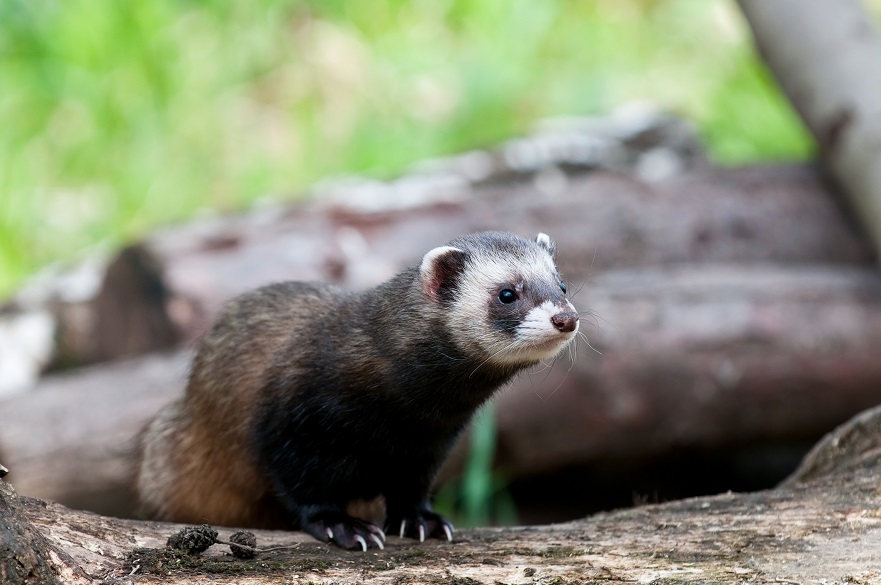Student’s footage reveals first polecat ever seen at university campus
A polecat, once on the brink of extinction, has been spotted at Nottingham Trent University’s Brackenhurst Campus for the first time.
By Dave Rogers | Published on 16 March 2022
Categories: Press office; Current students; School of Animal, Rural and Environmental Sciences;

Final year NTU wildlife conservation student Bethan Maguire captured footage of the nocturnal mammal on a camera trap while investigating badger numbers as part of her dissertation project.
Polecats, which are from the stoat and badger family, typically prey on rabbits and small rodents and favour lowland farmland and wooded habitats with extensive hedgerows.
Historically, polecats were found throughout mainland Britain, but during the 19th and 20th Centuries habitat loss, human persecution and hunting for their fur decimated their populations.
Their numbers dropped to an estimated 5,000 and they were only found in Wales and the West of England but have since recovered to an estimated 46,000 and are expanding East and North.
Their biggest threat to polecats today is considered to be traffic.
The 500-acre Brackenhurst Campus, nestled in the Nottinghamshire countryside about two miles from Southwell, is home to the university’s School of Animal, Rural and Environmental Sciences.
The campus is also home to resident badgers, roe deer, foxes, hares, hedgehogs, otters and weasels.
Polecat at NTU's Brackenhurst Campus (Video: Bethan Maguire)
Bethan said: “I was so shocked when I returned to my camera trap and saw the polecat footage. It was a great surprise to find such a species while studying badgers. The fun part of camera trapping is that you never know what you will find and we got so lucky to catch a great video of this little guy by accident.”
Dr Richard Yarnell, Associate Professor in Ecology at NTU, said: “We had no idea they were here so were delighted to see the footage of this species, which is making a recovery in the UK. We will continue to monitor our mammal populations across the Brackenhurst Campus and hope to record many more records of polecats in the future.”
Erin McDaid, Head of Communications and Marketing at Nottinghamshire Wildlife Trust, said: "It's always exciting when species start to recover and records come in for new parts of the county. The footage shows the value of trail cams and we'd also encourage folk to record any wildlife they discover across the county via the Nature Counts system."
Polecats, which can grow to about 32-45cm in length, have a two-tone coat, with dark brown guard hairs covering a buff-coloured underfur. They have a distinct bandit-like appearance, with white stripes across their dark face, a short, dark tail and rounded ears.
In the footage the Brackenhurst polecat can be seen standing upright and walking towards the camera.
More on the School of Animal, Rural and Environmental Sciences and the Brackenhurst Campus.
Notes for Editors
Press enquiries please contact Dave Rogers, Public Relations Manager, on telephone +44 (0)115 848 8782, or via email.
Nottingham Trent University (NTU) received the Queens Anniversary Prize for Higher and Further Education in 2021 for cultural heritage science research. It is the second time that NTU has been bestowed the honour of receiving a Queen’s Anniversary Prize for its research, the first being in 2015 for leading-edge research on the safety and security of global citizens. NTU was awarded Outstanding Support for Students 2020 (Times Higher Education Awards). It was the University of the Year 2019 (Guardian University Awards, UK Social Mobility Awards), Modern University of the Year 2018 (Times and Sunday Times Good University Guide) and University of the Year 2017 (Times Higher Education Awards). NTU is one of the UK’s largest universities, with over 33,000 students and more than 4,000 staff located across five campuses. It has an international student population of 4,000 and an NTU community representing around 160 countries. In the past 15 years, NTU has invested £450 million in tools, technology and facilities. NTU is in the UK’s top 10 for number of applications and ranked first for accepted offers (2019 UCAS UG acceptance data) It is also among the UK’s top five recruiters of students from disadvantaged backgrounds. 75% of NTU students go on to graduate-level employment or graduate-entry education / training within fifteen months of graduating (Guardian University Guide 2021). NTU is 4th globally (and 3rd in the UK) for sustainability in the 2021 UI Green Metric University World Rankings (out of more than 900 participating universities).